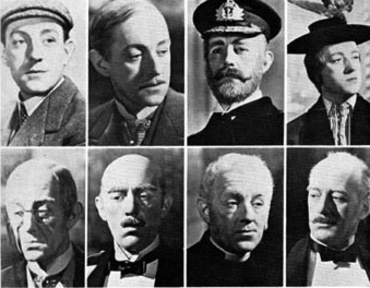Mark Steyn’s Saturday movie column is about the great Sir Alec Guinness:
In London one hundred years ago this week — April 2nd 1914 — Sir Alec Guinness, CH, CBE entered the world as Alec Guinness de Cuffe. His mother was Agnes Cuff, and the Frenchification of her maiden name seems to have been an attempt to compensate for the blank space on the birth certificate where “Name of Father” should appear. “Alec Guinness” were his two Christian names, leading to periodic suggestions that his pa was a member of the Guinness family. Sir Alec himself took the view that he had been sired by a Scottish banker who turned up at the flat once in a while purporting to be an “uncle” and who paid for his young “nephew” to be educated privately. He was, at least in public, not much interested in his parents, neither the absent nor the present one. From this appropriately vague lineage emerged one of the most versatile British actors of the 20th century, and (via Star Wars) one of the wealthiest.Eight Alec Guinness roles, from one film, Kind Hearts And Coronets (1949)
[…]
His other great military tour de force is as the carrot-topped carouser Major Jock Sinclair opposite John Mills’ by-the-book colonel in Ronald Neame’s Tunes Of Glory. An Ottawa reader who’d “sat through one mess dinner too many” wrote to me a few years ago to say that his all-time favorite Guinness movie line was Major Jock insisting, “Whisky for the gentlemen that like it, and for the gentlemen that don’t like it – whisky!” There’s a lot of Scottish dancing in the picture, and the film itself seems to reel, with Guinness’ blazing orange hair and heeland-flung accent poised brilliantly on a knife-edge of menacing heartiness.
That was unusual for him. I think it was Eileen Atkins who said that Guinness was the only actor who could do absolutely nothing in a close-up and yet you knew what he was thinking. It’s probably closer to the truth to say you knew he was thinking something, and you thought you knew pretty much what it was, but there was always the possibility that something more might be going on. A character like Colonel Nicholson has to be complex, or he simply doesn’t exist, and Guinness was a master at hinting at complexity, even when playing a piece of cardboard such as Obi-Wan. In an age of soul-barers, when Daniel Day-Lewis does Hamlet to work through his feelings about his father, Guinness remained a kind of Gypsy Rose Lee of great actors: he exposed very little, and thereby suggested that what lay underneath must be a real knockout. By the time he got to John le Carré’s George Smiley, he had mastered a unique skill: scene-stealing blankness, nicely caught on one of the early episodes of Whose Line Is It Anyway? when Jonathan Pryce, out of the blue, goes into a sly Guinness take-off — all glances off and an enigmatic smile.
He made his screen debut eight decades ago, in Evensong (1933). No one noticed. So he tried again with David Lean, as Herbert Pocke in Great Expectations (1946) and Fagin in Oliver Twist (1948), two superb performances. Then came his finest group of pictures — the Ealing years, beginning with Kind Hearts and Coronets (1949), in which he played eight different members of the d’Ascoyne family bumped off, in succession, by Dennis Price. Poor old Price actually gives the best performance, but no one cares: Kind Hearts is a novelty turn for Guinness, yet the film has a harder edge than his other Ealing films. To contemporary moviegoers, Ealing is a far more remote world than any in Star Wars — for a long time, the films were hard to get hold of and rarely aired on TV — but they show off brilliantly a youngish actor of unpromising looks but boundless inventiveness.
He had, by all accounts, a lower regard for his art than the other theatrical knights, but it served him well. And, unlike Olivier or Gielgud, Alec Guinness pulled off a unique double: he remains the only man in the galaxy to be knighted both by Her Majesty The Queen and the Jedi.




